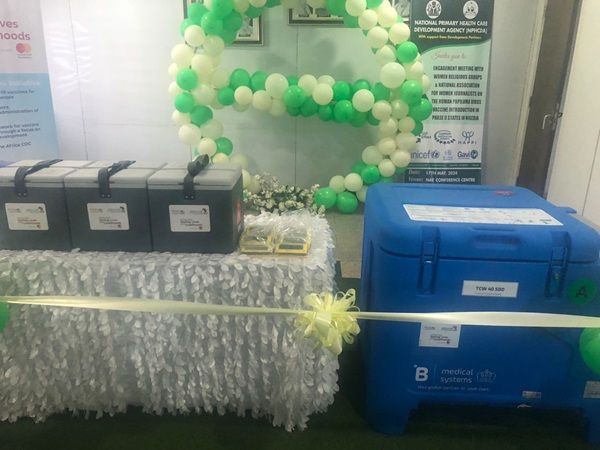
The Africa Centre for Disease Control and Prevention (Africa CDC) has lauded Nigeria’s strides in routine immunisation.
Director-general of Africa CDC, Dr. Jean Kaseya made this commendation on Friday in Abuja during the handover of cold chain equipment (CCE) donated to Nigeria by Africa CDC in collaboration with the Mastercard Foundation under the Saving Lives and Livelihoods initiative.
The cold chain equipment, comprising cold boxes, vaccine carriers and insulated boxes, plays a critical role in vaccine transportation. Active cold chain systems necessitate regular energy supply, while passive ones rely on continuous cold sources like water ice, dry ice, or gel packs.
Valued at over $3.5 million, the donation aims to bolster Nigeria’s immunisation system, a pivotal aspect of public health maintenance and infectious disease control. Kaseya underscored that this equipment would elevate Nigeria’s status as a frontrunner in immunisation and public health.
“It’s not a dream. We can do that because it’s a reality. As you see, that donation was related to COVID.
“But today, we can say COVID is over. We still have some cases, but it’s not the pandemic that we had before,” he remarked.
Expressing confidence in Nigeria’s trajectory, Kaseya highlighted fruitful discussions with key health officials, including the Minister and the Minister of State of Health. He also referenced his prior role as a humanitarian pastor, shaping his dedication to impactful health endeavours.
He emphasised the significance of collaborations with international organisations and local communities, extending gratitude to UNICEF for their ongoing partnership and revealing a commitment exceeding $100 million to support Africa. “We are co-creating the programme, working together in fun ways to implement it,” he added.
Kaseya stressed the importance of mutual respect and co-creation in development efforts. “We don’t want someone to come to impose us what we need to do. We need people to respect us,” he stated.
He noted that the support provided by Africa CDC and the Mastercard Foundation underscores their dedication to fortifying healthcare systems in Africa, emphasising collective collaboration in addressing global health challenges and ensuring vaccine equity for Africa.
Acting representative of UNICEF Nigeria, Dr. Rownak Khan underscored the significance of cold chain equipment in preserving vaccines and maintaining the efficacy of temperature-sensitive medical supplies. She highlighted how freezers and refrigerators would enable states to store a wider range of vaccines, including those requiring ultra-low temperatures.
“This expansion of cold chain storage is essential and will enable states to offer more comprehensive vaccination programs,” Khan remarked. She stressed how the cold boxes and vaccine carriers facilitate reliable transportation while maintaining the recommended vaccine temperature, ensuring vaccine efficacy and safety.
She emphasised that this feature boosts geographic coverage, contributing to improved immunisation service delivery and health security across Nigeria by enhancing states’ capacity to manage vaccines and strengthen their cold chain systems.
Executive director of the National Primary Health Care Development Agency (NPHCDA), Dr. Muyi Aina received the equipment on behalf of Nigeria. He stated that Africa CDC’s support aligns with the country’s goals to have readily available life-saving vaccines and strengthened cold chain capacity, noting its significant impact, particularly during the COVID-19 pandemic.
“This donation aims to enhance vaccine storage capacity and extend outreach to more communities across Nigeria,” he remarked. Aina highlighted the importance of vaccines in disease prevention and control and Africa CDC’s leadership during the pandemic, which was praised as a significant achievement.
He mentioned a thorough assessment conducted to identify gaps in cold chain facilities, ensuring effective allocation of the new equipment to maximise impact. He thanked Africa CDC and UNICEF teams for their cooperation and stressed the importance of data-driven decisions in public health initiatives.
Recalling that the Africa CDC, Mastercard Foundation, and UNICEF anticipate the successful installation and efficient use of these CCEs in healthcare facilities, he emphasised how it would positively catalyse and strengthen the healthcare landscape in member states. With this support, member states are better positioned to respond effectively to public health emergencies, ensuring equitable access to vaccines and treatments.

